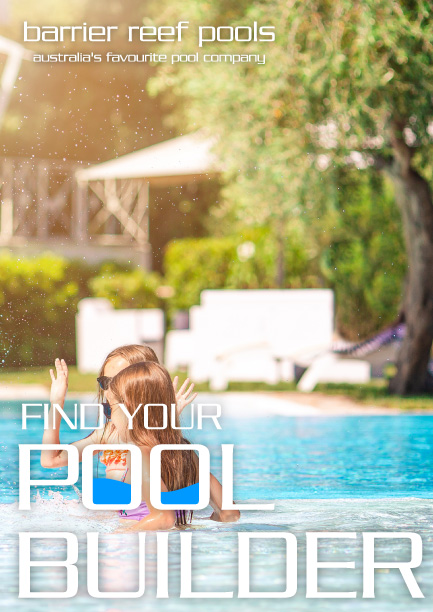Pool Chemicals For Beginners
When you first install a Barrier Reef fibreglass pool, you may not know where to start when it comes to pool maintenance and pool chemicals. Both of which are vitally important to keep your new pool in good shape. This helpful guide will outline everything you need to know about pool chemicals if you are a beginner, as well as critical information you need to maintain your pool.
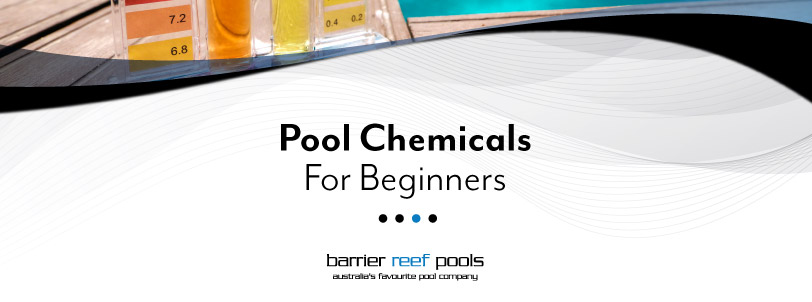
What Are Pool Chemicals?
It’s a straightforward question and most of you might already know the answer. Pool chemicals keep your pool safe to swim in, and make sure that there is no bacteria or algae growth in the water. The most commonly used pool chemicals are chlorine, bromine and sanitisers. Chlorine is a chemical which reacts with contaminants that enter the pool from rainwater, swimmers and other sources to make them safe for swimming in your Barrier Reef fibreglass pool. Bromine is another type of chlorine which works as an oxidiser to break down organic contaminants. Sanitisers help to keep your pool free from bacteria and viruses, keeping it safe for swimming.
How Can You Use Pool Chemicals Effectively
Effectively using pool chemicals begins with consistent testing of your pool water. Regular testing will provide a clear understanding of the levels of chlorine, bromine, and sanitiser in your pool. The ideal level of chlorine should be between 1.0 – 3.0 parts per million (ppm), while bromine should be maintained at levels of 3.0 – 5.0 ppm. Sanitisers should be used as per the manufacturer’s instructions, typically once a week. Always ensure to spread the chemicals evenly across the pool, and never mix different chemicals together as this could result in dangerous reactions. It’s also important to note that these chemicals should be added to the pool during the evening when the sun is down to prevent the UV rays from breaking them down. Lastly, remember to circulate the water for at least 4 hours after adding chemicals to ensure they are evenly distributed.
How To Test Your Water Chemistry Levels
Testing your water chemistry levels is a crucial part of maintaining a healthy and safe pool environment. The process involves taking a water sample from your pool, typically a foot or so below the water’s surface, and using a pool water test kit. These kits usually come with testing strips or liquid reagents that will change colour to indicate different chemical levels. Simply dip a testing strip into the sample or add the specified amount of liquid reagent, then compare the resulting colour to the chart provided in the kit. This will allow you to measure the levels of chlorine, bromine, and sanitiser in your pool. Regular testing, ideally at least once a week, will ensure your chemicals are at their optimal levels, thus helping to maintain the longevity and safety of your pool.
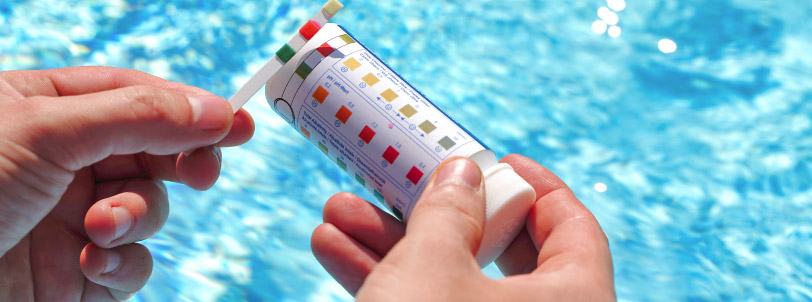
Keeping Your Pool Clean and Healthy: Top Tips
Maintaining cleanliness and health of your pool should be a top priority for every pool owner. Here are some essential tips to help you keep your pool clean and healthy:
Regular Skimming and Vacuuming
Skimming the surface of the pool for debris daily and vacuuming once a week keeps the water clear and reduces the need for chemicals.
Consistent Brushing
Brush the walls and floor of the pool at least once a week to keep algae and build ups at bay.
Maintain Water Level
Keep an eye on the water level. If it's too low, the pump may be damaged and if it's too high, the skimmer door may not work properly.
Shock Your Pool
'Shocking' or super-chlorinating your pool should be done periodically to kill off any lingering bacteria or algae.
Check and Clean Filters
Regularly check and clean the pool's filter as per the manufacturer's instructions. A clogged or faulty filter can undermine the quality of your pool's water.
Professional Inspection
Schedule an annual professional inspection to ensure all pool components are working properly and your water's chemical balance is correct.
Remember, a clean pool is a safe pool – and ensuring it remains in a healthy and swimmable condition is worth the time and effort.
Tricks For Monitoring Chemical Levels In Your Pool
Keeping track of your swimming pool’s chemical levels should be a part of your weekly routine. Maintaining the right balance not only ensures a healthy and safe swimming environment but can also prolong the lifespan of your pool. Here are some handy tricks for monitoring your pool’s chemical levels:
Use Technological Aids
Digital pool testing kits are available in the market that provide accurate measurements of your pool’s chemical levels. These devices require you to take a water sample and insert a testing strip or a reagent into it. The device then displays the chemical levels on a digital screen.
Use Smart Devices
There are smart devices available that float on your pool’s surface and regularly monitor the chemical levels. These devices can send notifications to your smartphone, making it even easier to keep track of your pool’s health.
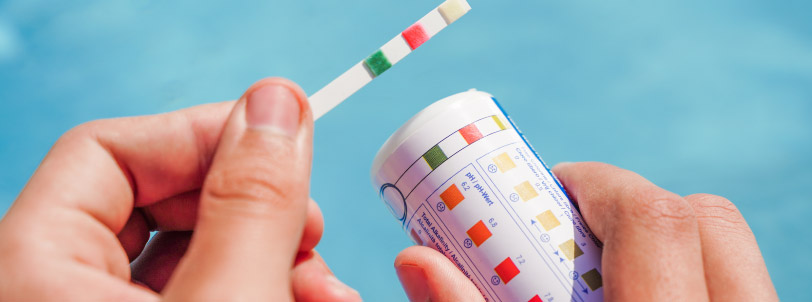
Keep a Log
Keeping a log of your pool’s chemical levels can help you track any changes over time and react accordingly. You can use a simple notebook or an online spreadsheet.
Educate Yourself
Understanding what each chemical does and how they interact will help you make the right adjustments when needed. Make use of online resources or consult with a pool maintenance professional to educate yourself about pool chemistry.
Consistency is Key
Make it a habit to check your pool’s chemistry at the same time each day. Natural factors such as sunlight and rain can affect your pool’s chemical balance, so testing at the same time each day gives you a more consistent reading.
Remember, maintaining your pool’s chemical balance is not just about adding chemicals as and when required. It’s about regularly monitoring and adjusting levels to ensure a safe and healthy swimming environment.
Safety Precautions When Using Pool Chemicals
When handling pool chemicals, safety should always be prioritised to prevent accidents and chemical reactions. Here are some essential safety precautions to observe:
Always Use Gloves and Goggles
When handling pool chemicals, always wear protective equipment such as gloves and goggles. This will prevent chemicals from coming into direct contact with your skin or eyes.
Proper Storage
Store pool chemicals in a cool, dry place out of reach of children and pets. Keep them in their original containers with labels intact, and avoid storing different types of chemicals together to prevent reactions.
Avoid Inhaling Fumes
When opening chemical containers, turn your head away to avoid inhaling the fumes. Ensure the area is well-ventilated to dissipate any chemical fumes.
Never Mix Different Chemicals
Combining different chemicals can result in dangerous reactions. Always add chemicals to water, never water to chemicals.
Dispose of Chemicals Properly
Do not pour extra pool chemicals down the drain or into the environment. Follow the manufacturer's instructions or local regulations for proper disposal.
Emergency Preparedness
Keep a first aid kit handy and know what to do in case of chemical contact, inhalation, or ingestion. In case of an emergency, contact a healthcare professional immediately.
Prevention is the best strategy when it comes to handling pool chemicals. Always take the necessary precautions to ensure a safe and enjoyable pool experience.
In conclusion, keeping a pool clean, healthy, and safe is a multi-faceted task that involves regular cleaning, diligent monitoring of chemical levels, and cautious handling of pool chemicals. By integrating these tasks into your routine, you can ensure your pool remains a safe and enjoyable space for everyone. However, each pool is unique and may require personalised care. If you’re ever uncertain about any aspect of pool maintenance, don’t hesitate to seek professional advice. Remember, the goal is to enjoy the benefits of your pool and ensure its longevity. If you are looking for a quality Australian made fibreglass pool, look no further than Barrier Reef Pools. Our award winning pools have been installed in Australian homes for the past 30 years. Contact us today or reach out for a free quote!
Pool Chemicals For Beginners
When you first install a Barrier Reef fibreglass pool, you may not know where to start when it comes to pool maintenance and pool chemicals. Both of which are vitally important to keep your new pool in good shape. This helpful guide will outline everything you need to know about pool chemicals if you are a beginner, as well as critical information you need to maintain your pool.
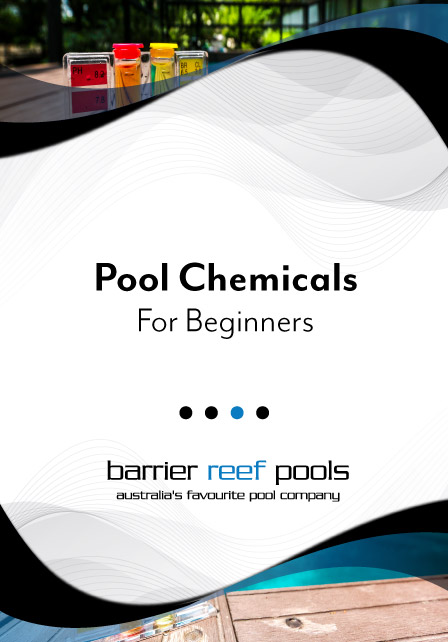
What Are Pool Chemicals?
It’s a straightforward question and most of you might already know the answer. Pool chemicals keep your pool safe to swim in, and make sure that there is no bacteria or algae growth in the water. The most commonly used pool chemicals are chlorine, bromine and sanitisers. Chlorine is a chemical which reacts with contaminants that enter the pool from rainwater, swimmers and other sources to make them safe for swimming in your Barrier Reef fibreglass pool. Bromine is another type of chlorine which works as an oxidiser to break down organic contaminants. Sanitisers help to keep your pool free from bacteria and viruses, keeping it safe for swimming.
How Can You Use Pool Chemicals Effectively
Effectively using pool chemicals begins with consistent testing of your pool water. Regular testing will provide a clear understanding of the levels of chlorine, bromine, and sanitiser in your pool. The ideal level of chlorine should be between 1.0 – 3.0 parts per million (ppm), while bromine should be maintained at levels of 3.0 – 5.0 ppm. Sanitisers should be used as per the manufacturer’s instructions, typically once a week. Always ensure to spread the chemicals evenly across the pool, and never mix different chemicals together as this could result in dangerous reactions. It’s also important to note that these chemicals should be added to the pool during the evening when the sun is down to prevent the UV rays from breaking them down. Lastly, remember to circulate the water for at least 4 hours after adding chemicals to ensure they are evenly distributed.
How To Test Your Water Chemistry Levels
Testing your water chemistry levels is a crucial part of maintaining a healthy and safe pool environment. The process involves taking a water sample from your pool, typically a foot or so below the water’s surface, and using a pool water test kit. These kits usually come with testing strips or liquid reagents that will change colour to indicate different chemical levels. Simply dip a testing strip into the sample or add the specified amount of liquid reagent, then compare the resulting colour to the chart provided in the kit. This will allow you to measure the levels of chlorine, bromine, and sanitiser in your pool. Regular testing, ideally at least once a week, will ensure your chemicals are at their optimal levels, thus helping to maintain the longevity and safety of your pool.
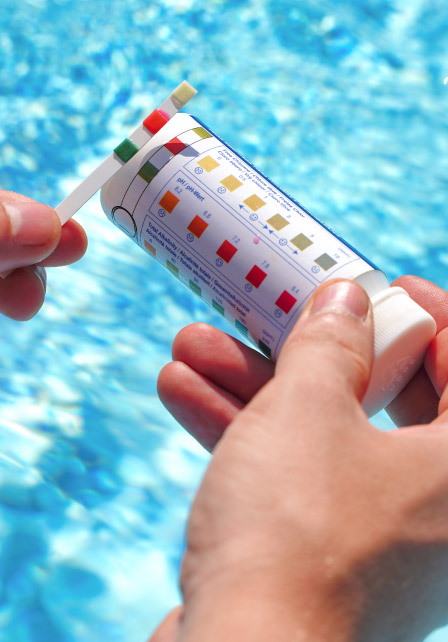
Keeping Your Pool Clean and Healthy: Top Tips
Maintaining cleanliness and health of your pool should be a top priority for every pool owner. Here are some essential tips to help you keep your pool clean and healthy:
Professional Inspection
Schedule an annual professional inspection to ensure all pool components are working properly and your water’s chemical balance is correct.
Regular Skimming and Vacuuming
Skimming the surface of the pool for debris daily and vacuuming once a week keeps the water clear and reduces the need for chemicals.
Consistent Brushing
Brush the walls and floor of the pool at least once a week to keep algae and build ups at bay.
Maintain Water Level
Keep an eye on the water level. If it's too low, the pump may be damaged and if it's too high, the skimmer door may not work properly.
Shock Your Pool
'Shocking' or super-chlorinating your pool should be done periodically to kill off any lingering bacteria or algae.
Check and Clean Filters
Regularly check and clean the pool's filter as per the manufacturer's instructions. A clogged or faulty filter can undermine the quality of your pool's water.
Professional Inspection
Schedule an annual professional inspection to ensure all pool components are working properly and your water's chemical balance is correct.
Remember, a clean pool is a safe pool – and ensuring it remains in a healthy and swimmable condition is worth the time and effort.
Tricks For Monitoring Chemical Levels In Your Pool
Keeping track of your swimming pool’s chemical levels should be a part of your weekly routine. Maintaining the right balance not only ensures a healthy and safe swimming environment but can also prolong the lifespan of your pool. Here are some handy tricks for monitoring your pool’s chemical levels:
Use Technological Aids
Digital pool testing kits are available in the market that provide accurate measurements of your pool’s chemical levels. These devices require you to take a water sample and insert a testing strip or a reagent into it. The device then displays the chemical levels on a digital screen.
Use Smart Devices
There are smart devices available that float on your pool’s surface and regularly monitor the chemical levels. These devices can send notifications to your smartphone, making it even easier to keep track of your pool’s health.
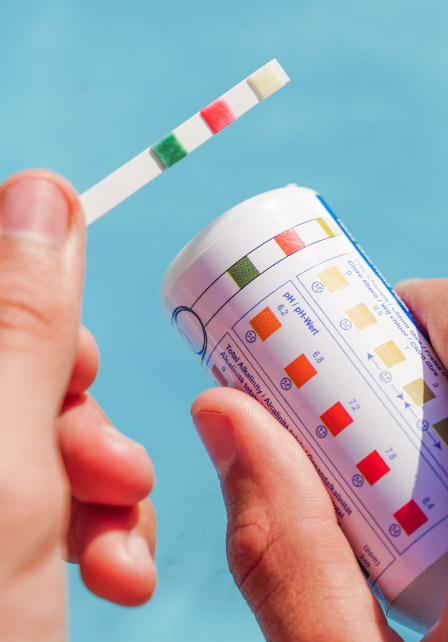
Keep a Log
Keeping a log of your pool’s chemical levels can help you track any changes over time and react accordingly. You can use a simple notebook or an online spreadsheet.
Educate Yourself
Understanding what each chemical does and how they interact will help you make the right adjustments when needed. Make use of online resources or consult with a pool maintenance professional to educate yourself about pool chemistry.
Consistency is Key
Make it a habit to check your pool’s chemistry at the same time each day. Natural factors such as sunlight and rain can affect your pool’s chemical balance, so testing at the same time each day gives you a more consistent reading.
Remember, maintaining your pool’s chemical balance is not just about adding chemicals as and when required. It’s about regularly monitoring and adjusting levels to ensure a safe and healthy swimming environment.
Safety Precautions When Using Pool Chemicals
When handling pool chemicals, safety should always be prioritised to prevent accidents and chemical reactions. Here are some essential safety precautions to observe:
Always Use Gloves and Goggles
When handling pool chemicals, always wear protective equipment such as gloves and goggles. This will prevent chemicals from coming into direct contact with your skin or eyes.
Proper Storage
Store pool chemicals in a cool, dry place out of reach of children and pets. Keep them in their original containers with labels intact, and avoid storing different types of chemicals together to prevent reactions.
Avoid Inhaling Fumes
When opening chemical containers, turn your head away to avoid inhaling the fumes. Ensure the area is well-ventilated to dissipate any chemical fumes.
Never Mix Different Chemicals
Combining different chemicals can result in dangerous reactions. Always add chemicals to water, never water to chemicals.
Dispose of Chemicals Properly
Do not pour extra pool chemicals down the drain or into the environment. Follow the manufacturer's instructions or local regulations for proper disposal.
Emergency Preparedness
Keep a first aid kit handy and know what to do in case of chemical contact, inhalation, or ingestion. In case of an emergency, contact a healthcare professional immediately.
Prevention is the best strategy when it comes to handling pool chemicals. Always take the necessary precautions to ensure a safe and enjoyable pool experience.
In conclusion, keeping a pool clean, healthy, and safe is a multi-faceted task that involves regular cleaning, diligent monitoring of chemical levels, and cautious handling of pool chemicals. By integrating these tasks into your routine, you can ensure your pool remains a safe and enjoyable space for everyone. However, each pool is unique and may require personalised care. If you’re ever uncertain about any aspect of pool maintenance, don’t hesitate to seek professional advice. Remember, the goal is to enjoy the benefits of your pool and ensure its longevity. If you are looking for a quality Australian made fibreglass pool, look no further than Barrier Reef Pools. Our award winning pools have been installed in Australian homes for the past 30 years. Contact us today or reach out for a free quote!


